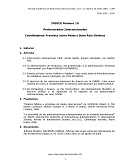“De facto states” versus “failed or fragile states”? Some notes on the theoretical difficulty to establish new typologies
Keywords:
international studies, political system typology, global transition, de facto states, securityCopyright (c) 2009 Pere VILANOVA

This work is licensed under a Creative Commons Attribution-NonCommercial-NoDerivatives 4.0 International License.
Abstract
The objective of this paper is to provide some introductory notes to the ongoing debate surrounding the phenomenon that we have provisionally come to call “de facto states”. This debate is part of a larger issue: the proliferation of names, labels and concepts referring to situations that in one way or another affect the concept of the state as an actor in contemporary international politics. This semantic proliferation is very much present in the current literature on the subject: fragile states, failed states, states under-pressure, quasi-states, and de facto states. The common framework for these terms (and others that are yet to be coined) is the concept of the state. Yet the state they refer to is always linked to certain anomaly: either it constitutes a political system that is formally recognized, but which cannot perform the functions of a state according to normal standards; or it refers to a political system that has the material profile of a state, but which lacks formal juridical recognition, thus restricting it to having only a functional role.





